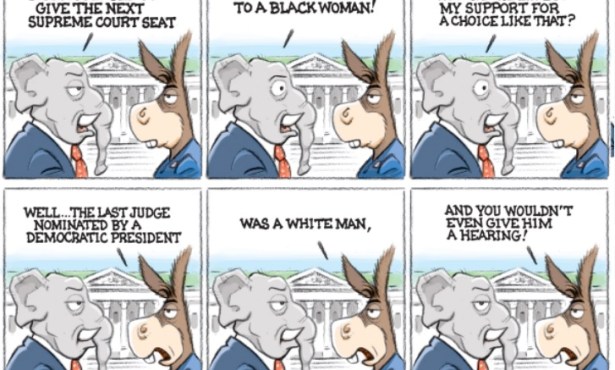Time to Mess with Texas
Law Banning Abortions Is Chaotic and Unconstitutional

The Texas law banning abortions after six weeks says anyone can enforce it. The absurdity of the law is best pointed out by the political theater produced by two out-of-state disbarred vigilante lawyers who sued a doctor who performed an abortion in defiance of the law, because they didn’t like the law.
The Arkansas vigilante said he was not opposed to abortion and that he sued to force a court to review the law. He described himself as a former lawyer who lost his law license after being convicted of tax fraud (for which he’s serving a 15-year prison sentence). He said he sued to force a court to review the Texas law because he didn’t “want doctors out there nervous … quaking in their boots … “
The Illinois plaintiff, an attorney suspended from the state’s bar for sending harassing and threatening emails, asked a court in San Antonio to declare the law unconstitutional. He called it government overreach. In filing his suit, he poked a finger at Republicans saying: “If Republicans are going to say nobody can tell you to get a [COVID] shot they shouldn’t tell women what to do with their bodies either.” (He said he wasn’t aware he could claim up to $10,000 in damages if he won his lawsuit).
While these two suits highlight the chaotic and ludicrous nature of what Texas Republicans did in their zeal to ban abortions, far more significant is what the Supreme Court did in failing to enjoin the law from taking effect.
Our system of government created the judiciary as not only a third independent branch of government, but as the fail-safe for a democracy. The other two branches of government (executive and legislative) are governed by politics. Courts, by design, are governed by stare decisis (legal precedents) as opposed to politics.
Stare decisis binds courts to follow legal precedents established by previous decisions. On September 2, the Supreme Court, in a 5-4 vote, refused to follow its own legal precedents of Roe v. Wade and of Planned Parenthood of Central Missouri v. Danforth and enjoin Texas’s anti-abortion law from taking effect. This marked the Supreme Court’s transition from an institution of laws to one dominated by politics. The gravity of this transition cannot be overstated.
Roe is the law of the land. Unless it is overturned, all courts are bound by it. Unequivocally, it protects a pregnant woman’s right to choose to have an abortion without excessive government restrictions. In creating this right, the Supreme Court established a balancing test based on the three trimesters of pregnancy. During the first trimester (0-13 weeks), governments cannot prohibit abortions; during the second (14-26 weeks), governments can require reasonable health regulations; during the third trimester (27 to 40 weeks) abortions can be prohibited as long as the laws contain exception to save the life or health of the mother.
The Texas law bans abortions during the first trimester (after six weeks) patently violating Roe. By creating the absurd vigilante enforcement system, it also ignores Planned Parenthood v. Danforth by transferring its obligation to enforce its law to private individuals. In Planned Parenthood, the Supreme Court struck down a Missouri law that transferred the power of enforcing its anti-abortion law to family members (spouses of married women and parents of minor women). The Supreme Court ruled that: “a state cannot delegate … a veto power [over the right to obtain an abortion] which the state itself is absolutely and totally prohibited from exercising during the first trimester of pregnancy.” This is exactly what Texas did by delegating the right to enforce its law to private individuals, regardless of being domiciled in Texas.
The Supreme Court’s ruling, allowing the Texas law to stand, was 5-4 against the High Court following its own precedents of Roe and Planned Parenthood. Under those precedents it should have enjoined the law pending a full adjudication through lower Texas courts. All three of President Trump’s anti-abortion appointees, Kavanaugh, Gorsuch, and Coney Barrett, voted with Justices Thomas and Alito. Their rationale expressed in a brief statement was: “[T]his order is not based on any conclusion about the constitutionality of Texas’s law … ” As Justices Bryer, Sotomayor, and Kagan pointed out in their dissent, it should have been because our legal system, i.e., stare decisis, required it.
Bryer, Sotomayor, and Kagan citing both Roe and Planned Parenthood said: ” A woman has a federal constitutional right to obtain an abortion during the first stage [trimester] … And, a state cannot delegate … a veto power [over the right to obtain an abortion] which the state itself is absolutely and totally prohibited from exercising during the first trimester of pregnancy.”
Chief Justice Roberts in his dissent said the law is “not only unusual, but unprecedented … [He correctly added] I would grant preliminary relief to preserve the status quo [Roe v Wade, and Planned Parenthood] before the law went into effect-so that the courts may consider whether a state can avoid responsibility for its laws … ” This was clearly what should have happened.
The chaos resulting from the Texas law is bizarre: doctors afraid to follow the law of the land (the Roe decision); women fleeing to other states seeking abortions, legal under the law of the land; and out of state vigilantes suing to invalidate the law. Elections have consequences. The integrity of the judiciary has become one of them.



